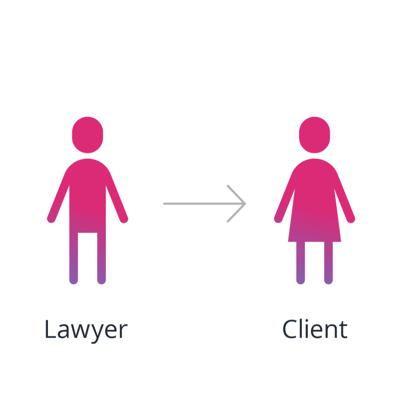The Future of How Legal Works Get Done
January 2021
By
Axiom Law

Legal functions everywhere are under the pump to do more with less. In fact, according to Gartner, 85% of legal decisions in the business go unsupported. This is resulting in 3 in 5 people in the business saying they don’t get the legal support they need and 75% of people also saying when they do engage legal, they don’t get value out of the engagement.
When you look behind the data, we see a few things at play (it certainly doesn’t mean that our lawyers are poor), but it really comes down to the fact that most legal functions don’t have a well-defined “service catalog” for the business to know how and when to engage legal vs other resources to leverage to get the answers they need to make sure the work gets done. Most Legal toolkits look much like a Law Firm:

This approach is not scalable, making the core challenge this: it is impossible for a Legal team of any size to reach the +80% of employees who make decisions that impact Legal risk every day.
As such, progressive legal functions are expanding their toolkit to support legal work across five channels.

Core Legal Team
Dedicated, technology enabled, in-house team focused on your comparative advantage to provide “strategic insight”. The in-house legal team is uniquely positioned to provide the best advice to the business as they understand:
- The industry
- The regulatory environment(s) in which the organization operates
- The strategy of the business
- The risk appetite of the organization
- The people and culture
At the intersection of the above factors, an in-house lawyer is incredibly well positioned to help create competitive advantage for the organization, and the nature of work the in-house legal team should be doing is here.
Strategic Secondment
Dynamic resources that adapt legal team capability and capacity to meet needs of the business. The most progressive legal functions allocate a percentage of the staffing budget to a rolling seconded headcount that they change as different needs arise in the business. This approach requires a partnership with an alternative legal services provider that understands your business and can bring in great, commercial lawyers across a range of topics and seniority. This approach not only gives you a more agile team, but also protects your Core Team from getting pulled out of their strategic work.
Axiom provides legal secondments in many different practice areas and industries.
Automated Legal Services
For all the low risk, low value work, progressive legal functions codify legal decision making by automating legal work to allow the business to self-serve their most used contracts and advice through automation of legal services and automated self-service apps. These apps can also include “risk triggers” that route “edge cases” that present riskier scenarios to legal (and/or others) for review.
There are two types of Self-Service Apps:
- Bespoke Apps – These apps generate your own contracts and advice based on your existing templates and playbooks.
- Best Practice Apps – These apps generate best practice contracts and advice that are created and maintained by a Law Firm. These can be quickly deployed and ensure your precedents are always up to date with the latest regulations.
Self-Service Apps can include automation of:
- Non-Disclosure agreements
- Supplier agreements
- Employment agreements
- Commercial agreements
- Partnership agreements
- Leases
- Independent contractor advice
- Data Privacy
- Influencer Agreements
- Product Disclosure Statements
Productized Legal Services
Whereas Automated Legal Services are automated advice and agreements supported by your team, Productized Legal Services are supported by a third party. These services are particularly applicable to tasks that are not core to your business and/or infrequent enough that your team does not have the capacity to become experts.
A productized Legal Service provides a Self-Service App for the business to use, but is also back by outside Lawyers with expertise in the area of the service. The business can self-service advice and agreements, but also get support and advice from a Lawyer for more complex scenarios.
Law Firms
Build and manage a small cost-effective provider network using standardized processes limited to specific work – that which is complex, not frequent and requires expertise that doesn’t make sense to have in-house, such as M&A, regulatory, Tax and litigation.
Posted by
Axiom Law
Related Content
How You Can Maintain a Flexible, In-House Career After Changes to IR35
Five reasons why Axiom can help you continue your legal career on your terms.
IR35 and the Future of Flexible Legal Services
How Axiom can help you maintain an agile legal department and in-house career after changes to IR35 are implemented in April 2021.
When to Hire an Additional In-house Lawyer
When to hire an additional in-house Lawyer? Fixed legal resourcing is putting businesses at a competitive disadvantage, and GCs are seeking a better way.
- Expertise
- North America
- Legal Department Management
- Must Read
- Perspectives
- Work and Career
- State of the Legal Industry
- Legal Technology
- Spotlight
- Solutions
- Artificial Intelligence
- Regulatory & Compliance
- United Kingdom
- Data Privacy & Cybersecurity
- General Counsel
- Legal Operations
- Australia
- Central Europe
- Commercial & Contract Law
- DGC Report
- Labor & Employment
- Regulatory Response
- Technology
- Banking
- Commercial Transaction
- Diversified Financial Services
- Hong Kong
- Intellectual Property
- Investment Banking
- Large Projects
- News
- Singapore
